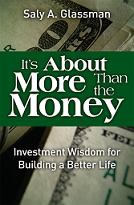Investing tips for today: Q&A with money expert Saly Glassman
By Barbara Marquand
In the wake of the financial meltdown, top money expert Saly Glassman says investors need to take responsibility of their finances and get their investments back on track. Glassman, ranked the nation's No. 1 woman financial advisor by Barron's, is author of "It's About More Than the Money: Investment Wisdom for Building a Better Life" (FT Press: 2010).
We recently chatted with her about today's hot personal money management issues, from coping with losses to investing independently with discount brokers.
MoneyBlueBook.com: What's your advice for investors coping with losses?
 Saly Glassman: The best way to deal with a loss is to step back and make an unemotional evaluation of what happened. By looking with more objectivity at the situation, you can analyze what role you played in contributing to that loss. Were you overextended with your borrowing? Did you have unrealistic expectations with that return? Did you not save enough? Did you not do enough research on the kind of investments you were buying and the person who was advising you? Ask yourself, "What role did I play in the loss that I incurred?"
Saly Glassman: The best way to deal with a loss is to step back and make an unemotional evaluation of what happened. By looking with more objectivity at the situation, you can analyze what role you played in contributing to that loss. Were you overextended with your borrowing? Did you have unrealistic expectations with that return? Did you not save enough? Did you not do enough research on the kind of investments you were buying and the person who was advising you? Ask yourself, "What role did I play in the loss that I incurred?"
If you say, "It's everybody else's fault," where does that take you? How can you be part of the solution if you had nothing to do with the problem?
MBB: What are the biggest mistakes investors have made in the last two years?
Glassman: Common mistakes are having inappropriate expectations, not saving enough money, investing with friends and thinking your situation will be different, overleveraging, living the consequences of someone else's choices, getting attached to things and not truly examining the value of what you have.
People struggle with decisions concerning the right thing now versus the right thing later. A younger person may think, "I'm young, and I have many more years to work, so I don't need to put money away in my 401(k). And besides, I'm going to inherit money from my parents."
But what if your parents were overleveraged, and what if they lose some of their assets? Or what if you or someone you love gets sick, or something dramatic changes, and you don't have any savings to fall back on?
MBB: What do you say to people who do all the right things and still lose?
Glassman: It's not a realistic expectation to think, "If I do all these things right, then I will have a 100 percent escape route for whatever I'm trying to avoid." What is realistic is to say, "All I can do is my best, every day, in the way that's important to me. If I can do that, I will increase the probability of achieving my goals, and minimize the things that will go against me."
 MBB: Why did you write the book?
MBB: Why did you write the book?
Glassman: I felt there had to be some sort of acknowledgment of the pain and suffering investors have gone through in the last few years, and there hasn't been enough of that from Wall Street. In addition, there needed to be steps taken to repair relations between the financial community and investors. There has to be a better level of trust and understanding, and the elimination of the sort of adversarial positioning that's built up over the years.
The title, "It's About More Than Money," is meant to help investors understand there is a much bigger picture in life, well beyond your money. I wanted investors and advisors to see that models for proper investing can be replicated in other areas of your life, like losing weight or being happier and being fulfilled.
MBB: What's missing from the average investor's strategy?
Glassman: There are products, investments and action. But there is no strategy. That's what's missing.
MBB: What do you do differently since the economic downturn?
Glassman: I think this economic downturn has solidified my point of view and made me even more confident in my principles. The downturn has been an enormous gift because it has given me the opportunity to rethink my relationships. I've learned to appreciate everything I have.
MBB: What's the next bubble?
Glassman: An obvious bubble is [U.S.] Treasuries, and I think gold is some kind of a bubble. If you're properly diversified you don't have to be so preoccupied by bubbles. An investment bubble becomes problematic when you lose track of the percentage of your portfolio that it should represent. When the "bubbling asset" gets over-weighted, it should be minimized. You should never find yourself a victim of a bubble. If you have, it's because you've been overextended in that asset class, and maybe even a little greedy.
MBB: What's the next hot investment?
Glassman: What's hot is you. It's not about products. You don't have to worry about finding what's hot. If you're properly diversified and you have a long-term strategy--and some piece of your strategy heats up--you're going to experience it.
The irony of that is I'll be calling you to trim that position when it's doing very, very well. And you'll say to me, "I can't believe you're telling me to do that, because this is where I'm making all the money." Exactly, that's why you need to leave. Conversely, when something is undervalued and you are underweighted in it, you need to increase your position.
MBB: What's your advice for do-it-yourself investors using discount brokers?
Glassman: Investing independently does not have to mean going it alone! You can make a long-term plan for yourself that incorporates your highest priorities in your life. Then, break those into smaller components and rank them in importance. Check these rankings with a trusted friend or advisor. Your goals should include short- and long-term objectives.
Your savings plan should continue regardless of your immediate needs. For example, you may need a new washing machine, but you also have been dreaming about a trip to a beach resort. In addition, you have committed to putting tax-deferred contributions to your 401(k) plan. You may be able to negotiate on price, availability, convenience, etc. on products and vacations. Your future quality of life, however, has to be considered with the greatest attention to the big picture.
Eventually, as you accumulate more assets, you may see the beneficial advice of an investment professional to guide you with more complex choices.
MBB: How does your perspective differ from that of television financial personalities, such as Suze Orman?
Glassman: When I advise a client, my compensation is tied to investment performance; I experience personally the consequences of my recommendations. That creates a rather immediate and vivid perspective.
It's like the difference between watching a movie and acting in a movie. You may not be less credible in watching the movie, but when you're acting and living the movie, it's real experience. It's vivid and immediate. It's a strong incentive to be accurate when taking care of your clients.
Barbara Marquand is a business writer with more than 20 years reporting experience for newspapers, magazines and Web sites. She writes frequently about personal finance issues.
January 1, 1970 at 12:00 am